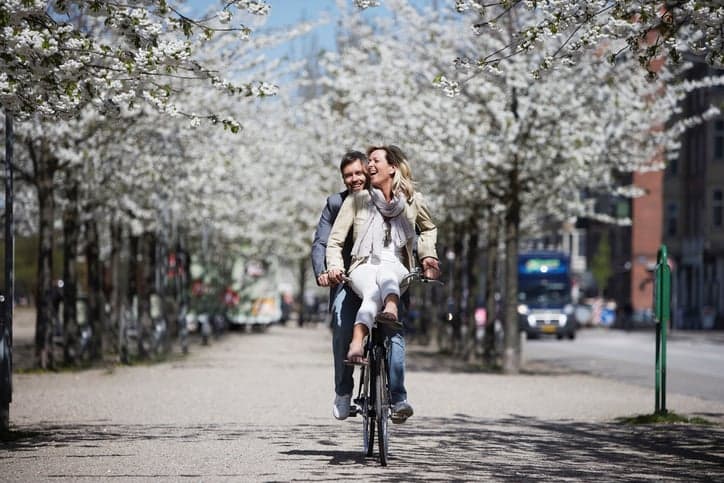Spring is in the air, could romance be too? A new survey has the answers
The coronavirus pandemic has made significant changes to the way in which we live, and none more so than in the area of dating and relationships. Together with dating app Inner Circle, we explore some of the behavioural differences that research has uncovered, and talk to people about how they plan to date in a post-pandemic world.

2020's State of Dating report, commissioned by Inner Circle, revealed that – perhaps unsurprisingly – our love lives have taken a hit. Government restrictions and public health measures led 55 percent of respondents to say that they dated less. A further 33 percent stated that they didn't view dating as a priority during the lockdowns. Much of this sentiment can be tied to the fact that most respondents prefer to meet a partner face to face, with 47 percent of participants responding to that effect.
Join Inner Circle today and learn more about their approach to dating
‘I got to know my sofa’
In interviews conducted by The Local, this sentiment was repeated. Miguel, a Canadian now in Paris found that dating came to a “screeching halt” and that he went from getting to know the city and its people, to “getting to know my sofa”. He continues saying that, "During the first lockdown we were only allowed to leave the house for exercise, or to get groceries – dating was not on the form we needed to have, trust me, I looked”.
Elena, an Australian comedian based in Berlin, found that dating fell by the wayside, as services sprung up to fill the needs of those locked down. As she told us, "All of our needs are met, we can order anything from Amazon, like food delivery or a vibrator". Elena also reflected that lockdowns led to a significant restriction in dating options. "On first dates you normally would go to a restaurant, nightclub or live music gig. However, those options are not there, it's either their place, or yours... or a walk in the park".
 Elena performing at a comedy club. Pic: Supplied
Elena performing at a comedy club. Pic: SuppliedLight (and love) at the end of the tunnel
However, all is not lost. Research by Inner Circle showed that there is optimism, hope and a real desire for connection. In France, while 43 percent of respondents were optimistic about their love life, 70 percent have said that they consider their romantic meetings more important this coming year. Additionally, 67 percent seek to make more effort to meet this year and almost three-quarters of those surveyed are looking to commit to a relationship. If you’re single, now really is the time to get involved.
Meanwhile, in Italy - a traditional holdout against online dating apps - Inner Circle saw a 151 percent increase in users than at the same time last year, with a 47.8 percent increase in traffic over the first month of the year. It seems that spirits are improving and love once again is in the air, especially in romantic hotspots like Rome and Milan.
Join the Inner Circle, download the app and start meeting people today!
 Photo: Inner Circle
Photo: Inner CircleA helping hand
For those looking for a partner, apps such as Inner Circle provide an enjoyable, direct way to meet people. Curated profiles, conversation prompts and friendly advice help users to make their best impression, and it's easy to let others know how, where and when you wish to meet under Covid-19 guidelines.
Unlike many dating apps, Inner Circle also makes sure to screen profiles, to ensure that users have included good photos of themselves and rich information that helps others discover them. No more endless swiping - profiles on Inner Circle tell a story, one that you may want to be a part of.
Once restrictions are lifted, Inner Circle will recommence their popular events in France, Italy and Spain, allowing users to meet in a fun and flirtatious environment. They're a consistent sell-out, so we’re sure they’ll be plenty of singles wanting to get their hands on tickets.
So how are those we spoke to hoping to date post-pandemic? Elena in Berlin tells us, "I think I will definitely know what I really want in a partner and won't settle for people who aren't all in. I think this time has given a lot of us a more focused approach to dating, rather than pre-Covid, when it was full of distractions." Miguel in Paris has similar thoughts, "On a personal level, I think I'm going to be more direct and not waste any more time. If something isn't working, I'm going to move on and keep looking".
Ready to get out there and meet someone? Sign up for Inner Circle today, and see who the world has in store for you!
This content was paid for by an advertiser and produced by The Local's Creative Studio.

Join the conversation in our comments section below. Share your own views and experience and if you have a question or suggestion for our journalists then email us at [email protected].
Please keep comments civil, constructive and on topic – and make sure to read our terms of use before getting involved.
Please log in here to leave a comment.